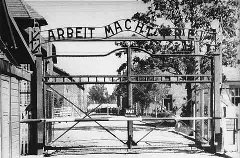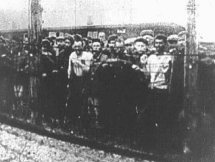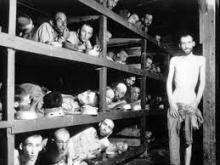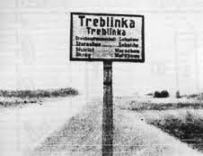MORE FREE TERM PAPERS
- RESEARCH PAPERS: - HISTORY -
|
|||||||||||||||||||
“Death and Extermination Camps”
One
of the most devastating events to take place in history was the Holocaust.
There were many factors leading up to the Holocaust but one that sticks
out to many people, were in fact the death and extermination camps. After
the Ghettos were liquidated, there was a selection process and Jews would
be chosen to either be labor workers, or sent to death camps. Many lives
were changed drastically due to this event, and millions of innocent people
were lost due to the darkness and cold hearts of the Nazis. Six death
camps and extermination camps were established throughout Poland. To fully
comprehend the power and destruction of the Holocaust, no person could
wrap their minds around.
The six death and extermination camps were; Auschwitz-Birkenau,
Belzec, Chelmno, Majdanek, Sobibor,
and Treblinka. According to the article,Concentration and Death
Camps Chart, the infamous Auschwitz-Birkenau was established in Oswiecim,
Poland in May 26th, 1940, but was evacuated January 18th, 1945. During
the time that Auschwitz was running, over 1,100,000 innocent Jews are
murdered (History 1900’s). This center was also one of the largest extermination
centers in Poland.
Auschwitz
 Jewish
Gen lists, “the Auschwitz complex was divided in three major camps: Auschwitz
I main camp or Stammlager; Auschwitz II or Birkenau, established on October
8th, 1941 as a ‘Vernichtungslager’ (extermination camp); Auschwitz III
or Monowitz, established on May 31st, 1942 as an ‘Arbeitslager’ or work
camp; also several sub camps. There were up to seven gas chambers using
Zyklon-B poison gas and three crematoria. Auschwitz II included a camp
for new arrivals and those to be sent on to labor elsewhere; a Gypsy camp;
a family camp; a camp for holding and sorting plundered goods and a women's
camp. Auschwitz III provided slave labor for a major industrial plant
run by I G Farben for producing synthetic rubber. Highest number of inmates,
including sub-camps: 155,000. The estimated number of deaths: 2.1 to 2.5
million killed in gas chambers, of whom about 2 million were Jews, and
Poles, Gypsies and Soviet POWs. About 330,000 deaths from other causes”.
(The Death Factory)
Jewish
Gen lists, “the Auschwitz complex was divided in three major camps: Auschwitz
I main camp or Stammlager; Auschwitz II or Birkenau, established on October
8th, 1941 as a ‘Vernichtungslager’ (extermination camp); Auschwitz III
or Monowitz, established on May 31st, 1942 as an ‘Arbeitslager’ or work
camp; also several sub camps. There were up to seven gas chambers using
Zyklon-B poison gas and three crematoria. Auschwitz II included a camp
for new arrivals and those to be sent on to labor elsewhere; a Gypsy camp;
a family camp; a camp for holding and sorting plundered goods and a women's
camp. Auschwitz III provided slave labor for a major industrial plant
run by I G Farben for producing synthetic rubber. Highest number of inmates,
including sub-camps: 155,000. The estimated number of deaths: 2.1 to 2.5
million killed in gas chambers, of whom about 2 million were Jews, and
Poles, Gypsies and Soviet POWs. About 330,000 deaths from other causes”.
(The Death Factory)
Belzec
The construction of Belzec began November 1st1941; Polish
civilians began working on the killing center on the outskirts of Belzec.
The first gassing phase took place June 19th 1942. The gas chambers in
Belzec were capable of holding and killing 1,000 people at one time. An
article from YadVashem explains, “The Nazis commenced construction of
Belzec in November 1941, and a result to exterminate two million Jews
in the Generalgouvernment (large area in Poland). In total six hundred
thousand people, mostly Jews and a few hundred Gypsies were murdered in
Belzec”.(YadVashem).
According
to RudulfReder in an article on YadVashem, “I was in the death camp from
August until the end of November 1942. This was the period of the mass
suffocation of Jews. A few of my companions in misfortune, the few who'd
manage to be there longer, told me that the most death transports were
in this period. They arrived every day, without a single day's break,
usually three times a day, with fifty cars in every train, and every car
had a hundred people in it. When transports arrived at night, the victims
of Belzec waited in the closed cars until six in the morning. On average,
ten thousand people a day were put to death.” (Belzec).Rudulf continues
to say that when Jews arrived in Belzec, they were ordered to undress
and leave belongings in the yard. Deceitful speeches were always given
to cheer up the new arrivals to give them false hope. Just moments later,
elderly were taken away, then men, women and children were lead to gas
chambers. In Rudulfs testimony, he gives explanations about everything
that he witnessed, including the awful murders.
Chelmno
According to the article The Holocaust, Chelmnowas one of
the first extermination camps to be established on Polish soil. The first
wave of murder began December 8th, 1941 and continued until late January
of 1945. Jews from the Lodz ghetto were transported to Chelmno. When they
arrived at the camp they were stripped of all their clothing and belongings,
once this happened, they were loaded onto mobile gas vans moments after
they reached the camp. The mobile gas vans had a pipe on the inside of
the van which leads to the exhaust pipe. Immediately, the gas vans would
drive to the burial site in a forest nearby. Once they reached the burial
site, all of the Jews inside the vans had died. With having only three
gas vans 300,000 Jews and 5,000 Sinti and Roma were murdered (YadVashem).
Furthermore,
Chelmno explains what happened after the vas left. “A few Jewish prisoners
were selected from incoming transports to form a forced-labor detachment
(Sonderkommando) of 50 to 60 men deployed at the forest camp. They removed
corpses from the gas vans and buried them in the mass graves. Because
the graves quickly filled and the smell of decomposing bodies began to
permeate the surrounding area, including nearby villages, the SS and police
ordered in summer 1942 that in future the bodies be burned on open air
“ovens” made of rail track in the forest camp. Jewish Sonderkommando members
were also responsible for exhuming the graves and burning the previously
interred bodies. In addition, they sorted the clothing of the victims
and cleaned the vans. Another small detachment of about 15 Jews worked
at the manor house, sorting and packing the belongings of the victims.
Between eight and ten skilled handicraftsmen produced or repaired goods
for the SS special detachment. Periodically, SS and police officials would
kill the members of the Jewish special detachments and replace them with
laborers selected off of new transports.” (United States Holocaust Memorial
Museum) (USHMM)
Majdanek
Majdanek (Poland) states: Madjanek was opened October 1942
originally as a prisoner of war (POW) camp. The maximum number of inmates
located at Majdanek was estimated to be 25,000. When the camp was being
built, it was only built with two gas chambers that used Zyklon-B poisoning,
and later on replaced by brick building gas chambers.
 The first murders began April 1942 and ended in July 1944. As a part of
the “Final Solution”, an estimated 130,000 Jews were deported to Majdanek.
Once gas chambers started being used for the imported Jews, the Nazi’s
needed to get rid of the POW’s, so they decided on killing them in the
mass shootings. The largest massacre to happen inside Majdanek was on
November 3rd 1943 when approximately 17,000 Jews were machine-gunned to
death as part of the “ErntefestAktion” (Majdanek Extermination Camp)
The first murders began April 1942 and ended in July 1944. As a part of
the “Final Solution”, an estimated 130,000 Jews were deported to Majdanek.
Once gas chambers started being used for the imported Jews, the Nazi’s
needed to get rid of the POW’s, so they decided on killing them in the
mass shootings. The largest massacre to happen inside Majdanek was on
November 3rd 1943 when approximately 17,000 Jews were machine-gunned to
death as part of the “ErntefestAktion” (Majdanek Extermination Camp)
Moreover, an account on About History claims, on a cold day on November
3rd 1943, the Nazis decided to commit a simultaneous act of mass murder
in the remaining three camps in the Generalgouvernment, Trawniki, Poniatowa
and Majdanek. The code name for this event was Erntefest (“Harvest Festival”).
The Nazi’s heard about the revolt in the Warsaw Ghetto in April 1943,
then again in August, this time in the Treblinka death camp, one more
uprising in the Sibbor death camp on October 14th 1943. The Nazis began
to worry that there would be another attempted revolt; in order to prevent
it they would eliminate the remaining Jews in the Generalgouvernment.
The killing would take place on a specific day, November 3rd 1943. The
murder of the estimated 43,000 Jews during the AktionErntefest was not
only a very bloody day in history, but also the end of the AktionReinhard.
(ErntefestAktion)
Sobibor
 According
to YadVashem, Sobibor was located in Lublin Poland. The death camp was
established in March of 1942 as part of the AktionReinhard, but was soon
shut down near the end of 1943 due to the amount of prisoner uprisings
occurring. An estimated number of Jews murdered here sits at an astonishing
250,000 Jews. The construction of this camp was designed to hide what
was on the inside. Sobibor was divided into three sections; administration
area, reception area, and the extermination area. The deported Jews were
taken to the reception area as soon as they arrived, and were told to
strip down and leave belongings in a pile since they were going to shower,
and so the Germans could disinfect all of the clothes and personal belongings
before getting back on the train. Since the Jews were held in the reception
area, they were unable to see the extermination area, which was gas chambers,
burial tranches, and housing for the Jewish workers. The gas showers were
built to hold 160-180 people, and instead of using the Zyklon-B poisoning,
Sobibor used carbon monoxide gas (Sobibor)
According
to YadVashem, Sobibor was located in Lublin Poland. The death camp was
established in March of 1942 as part of the AktionReinhard, but was soon
shut down near the end of 1943 due to the amount of prisoner uprisings
occurring. An estimated number of Jews murdered here sits at an astonishing
250,000 Jews. The construction of this camp was designed to hide what
was on the inside. Sobibor was divided into three sections; administration
area, reception area, and the extermination area. The deported Jews were
taken to the reception area as soon as they arrived, and were told to
strip down and leave belongings in a pile since they were going to shower,
and so the Germans could disinfect all of the clothes and personal belongings
before getting back on the train. Since the Jews were held in the reception
area, they were unable to see the extermination area, which was gas chambers,
burial tranches, and housing for the Jewish workers. The gas showers were
built to hold 160-180 people, and instead of using the Zyklon-B poisoning,
Sobibor used carbon monoxide gas (Sobibor)
The article proceeds to say on YadVashem, “The gas chambers were sealed
once the maximum potential of victims were inside. Poisonous gas was then
piped in. Within 20-30 minutes, all those inside were dead. Jewish work
teams – known as Sonderkommando removed the bodies, pulled out any gold
teeth, and buried the dead. The whole process, from arrival to burial,
took only two or three hours. During that time, prisoners were forced
to clean the railroad cars, after which the trains left and another 20
cars entered the camp. Those Jews who were not sent to the gas chambers
immediately underwent a Selektion process, which continued daily. Only
a few survived for more than a few months.” (Sobibor)
Treblinka
According to Treblinka, the death camp, Treblinka is located
in the northeastern part of the Generalgouvernment. Treblinka was established
in the early summer of 1942 as a part of the AktionReinhard. Approximately
870,000 Jews and other deportees were murdered here. This camp is very
similar to Sobibor in the layout, it had high barriers so no one could
see in. Treblinka was separated into three sections, the living area,
the reception area, and the extermination area. Just like many other death
camps, they Jews were taken to only the reception area so they could not
see their dark fate that lays ahead, the extermination area. When the
Jews arrived, they were told they were taking a brief stop to disinfect
everything and were lead to the “showers” (YadVashem)
 The
article states from YadVashem, “The extermination process at Treblinka
was based on experience gained by the Nazis in Belzec and Sobibor- the
two other AktionReinhard camps. When a train made up of 50 - 60 cars,
holding some 6,000 - 7,000 people, arrived at the nearby train station,
20 cars were brought into the camp, while the rest were made to wait in
the station. The car doors were opened, and SS officers ordered the Jews
to disembark. Next, a camp officer would announce to the new arrivals
that they had reached a transit camp where they would take showers, have
their clothes disinfected, and then travel on to various labor camps.
After this announcement, the Jews were taken to "Deportation Square."
Men and women were separated - children going with the women. The women
and children were made to undress in a barrack, and the women's hair was
cut. Naked, they were forced to leave the barrack and enter the "pipe"-
a narrow, fenced-in, camouflaged path that led to the gas chambers. After
the victims were locked into the chambers, the engine was started and
poison gas poured in. Within half an hour, all inside were dead, and the
next group of victims would prepare to enter. Meanwhile, the bodies were
removed and taken for burial in the trenches. This last job was done by
a team of Jewish prisoners, called Sonderkommando”. (Treblinka).
The
article states from YadVashem, “The extermination process at Treblinka
was based on experience gained by the Nazis in Belzec and Sobibor- the
two other AktionReinhard camps. When a train made up of 50 - 60 cars,
holding some 6,000 - 7,000 people, arrived at the nearby train station,
20 cars were brought into the camp, while the rest were made to wait in
the station. The car doors were opened, and SS officers ordered the Jews
to disembark. Next, a camp officer would announce to the new arrivals
that they had reached a transit camp where they would take showers, have
their clothes disinfected, and then travel on to various labor camps.
After this announcement, the Jews were taken to "Deportation Square."
Men and women were separated - children going with the women. The women
and children were made to undress in a barrack, and the women's hair was
cut. Naked, they were forced to leave the barrack and enter the "pipe"-
a narrow, fenced-in, camouflaged path that led to the gas chambers. After
the victims were locked into the chambers, the engine was started and
poison gas poured in. Within half an hour, all inside were dead, and the
next group of victims would prepare to enter. Meanwhile, the bodies were
removed and taken for burial in the trenches. This last job was done by
a team of Jewish prisoners, called Sonderkommando”. (Treblinka).
Conclusion
In conclusion, these six death camps, Auschwitz-Birkenau, Belzec, Chelmno, Majdanek, Sobibor, and Treblinka will forever be talked about in the history books, as well as all of the dark evil of AdolfHitler and the Nazi’s. There were many killing methods used during the holocaust, but the two ways used in the death camps were Zyklon-B poisoning and carbon monoxide.Approximately 11 million people were brutallymurdered in the Nazis genocide; estimated 1.5 million were children, and five million non-Jews (Gypsies, Salvs, Homosexuals, and people in the wrong place at the wrong time).
Works Cited
"AktionErntefest." About.com 20th Century History.About.com 20th Century History.Web. 15 Apr. 2013.
"Auschwitz-Birkenau - "The Death Factory"" Jewish Gen. YadVashem.Web. 10 Apr. 2013.
"Belzec."YadVashem. , FundacjaJudaicaPanstwoweMuzeumOswiecimBrzezinka. Web. 12 Apr. 2013.
"Belzec."YadVashem. YadVashem. Web. 12 Apr. 2013.
"Concentration and Death Camps Chart."Concentration and Death Camps Chart.History 1900's.Web. 12 Apr. 2013.
"Holocaust History."Chelmno.USHMM.Web. 15 Apr. 2013.
"The Holocaust."Holocaust History.YadVashem. Web. 15 Apr. 2013.
"Majdanek Extermination Camp (Poland)." Majdanek Extermination Camp (Poland). Jewish Gen. Web. 15 Apr. 2013.
Reder, Rudulf."Belzec."YadVashem. , FundacjaJudaicaPanstwoweMuzeumOswiecimBrzezinka. Web. 12 Apr. 2013.
"Sobibor."YadVashem. YadVashem. Web. 15 Apr. 2013.
"Treblinka."YadVashem. YadVashem. Web. 15 Apr. 2013.
